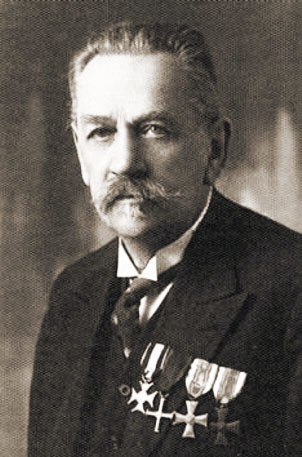Jędrzej Moraczewski was born in Trzemeszno on 13th January 1870. He was a socialist, soldier of the First Brigade of the Polish Legions and Prime Minister of the Government of the Republic, who subordinated his entire life to the struggle for independence and the maintenance of the sovereign existence of the Polish state.
He grew up in an intellectual, patriotic family. His father, Maciej Moraczewski, a nobleman (coat-of-arms Cholewa), was a well-known architect and builder, fought in the January Uprising under the command of Marian Langiewicz. After finishing gymnasium, Jędrzej enrolled at Lwów Technical University, where he became involved with the student organisation ” Brotherly Aid”, activating a self-education and independence group. During this period, he encountered socialists. Convinced that peasants and workers should be involved in the fight for Poland’s independence, he joined the Galician Social Democratic Party. On its behalf he became a member of the Austrian Parliament, where he strove for workers’ rights and the provision of social and welfare benefits for the poorest.
After the outbreak of WWI, he co-organised the Riflemen’s Troops, joining the Polish Legions in August 1914. As a soldier of the First Brigade of the Legions, on the orders of Józef Piłsudski, he became a member of the Supreme National Committee, the political representation of Poles in Galicia. After Piłsudski’s arrest and incarceration in the Magdeburg Fortress, he was one of the leaders of the secret pro- Piłsudski group, called Convent of Organisation A, acting at the same time as political director of the Polish Military Organisation (POW).
On the eve of regaining independence, he became a member of the Polish Liquidation Commission for Galicia and Cieszyn Silesia, tasked with abolishing the legal relations between Galicia and Austro-Hungary. On 6th November 1918, he took up the post of Minister of Posts and Communications in the Provisional People’s Government of the Polish Republic in Lublin, and then, on Piłsudski’s orders, became Prime Minister of the Polish Government, introducing, among other things, universal suffrage for women, an 8-hour working day, and the right to strike and form trade unions.
He was active as a parliamentarian and trade unionist throughout the interwar period. He died on 5 August 1944 in his flat in Sulejówek, hit by a fragment of an artillery shell.





